The Indonesian Cultural Night (ICN) 2025, hosted by the Indonesian Students Association at the University of Michigan (ISA-UM), was truly a night to remember. With the theme “Rhythms of the Archipelago,” this year’s event invited guests to experience the richness and diversity of Indonesian culture—from the western province of Aceh to the eastern region of Papua.
Although we initially planned to include a Gamelan performance, the team was unable to join us in the end. Nevertheless, the evening came together beautifully, filled with vibrant performances, engaging activities, and delicious food that brought everyone together in celebration.
The program opened with remarks from our faculty advisor, Ms. Agustini, and a warm welcome from ISA-UM president Rissa Prakosa. Their messages highlighted the importance of cultural events like ICN in building understanding and a sense of community on campus. Throughout the evening, our emcees helped keep the audience engaged, sharing background stories and cultural context for each performance.
The first performance was Ratoe Jaroeh, a traditional dance from Aceh. We chose this piece to open the show because of its welcoming message, including the line “Assalamualaikum kami ucapkan para undangan yang baru teka,” meaning “Peace be upon you, welcome to our newly arrived guests.” The dancers performed in perfect harmony, sitting in rows and moving their hands rhythmically in a captivating display of unity and tradition. Next was a stunning traditional Balinese dance, which told the story of a wandering prince. Known for its spiritual significance, the performance featured dramatic expressions, ornate costumes, and precise movements that held the audience’s attention from beginning to end.
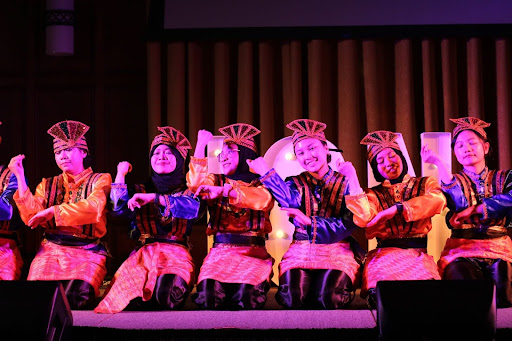
Ratoe Jaroeh Dance.
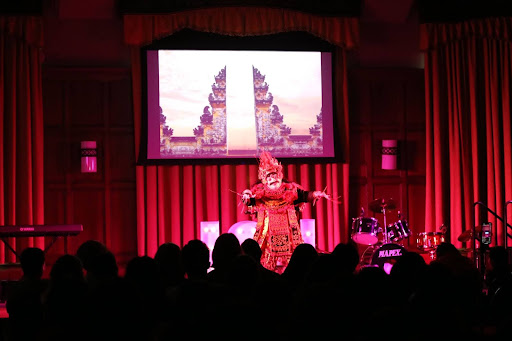
Balinese Dance.
Following the dance, we hosted a trivia segment about Indonesia. It was both informative and fun, with questions covering geography, language, and culture. The audience responded enthusiastically, and it helped keep the energy high while sharing knowledge about our country. One of the most special performances came from Amazin’ Blue, a campus a cappella group that includes one of our fellow Indonesian students. They performed an Indonesian song, blending their signature harmonies with our traditional melody in a beautiful moment of cultural fusion.
Later in the evening, we brought everyone into the action with games from our Independence Day traditions. The first was lomba makan kerupuk, or cracker-eating competition, where participants raced to eat a hanging cracker without using their hands. It’s a simple game, but much harder (and funnier) than it looks. The second game, “ping-to-the-pong,” involved teams passing a ping-pong ball between glasses placed on each other’s heads, leading to lots of laughter and teamwork. The winner announcement for the Independence Day’s games and Trivia were merged with the winner for the best traditional costumes.
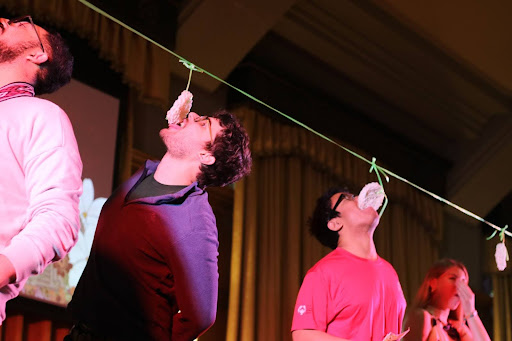
Independence Day’s Game (Cracker-eating competition).
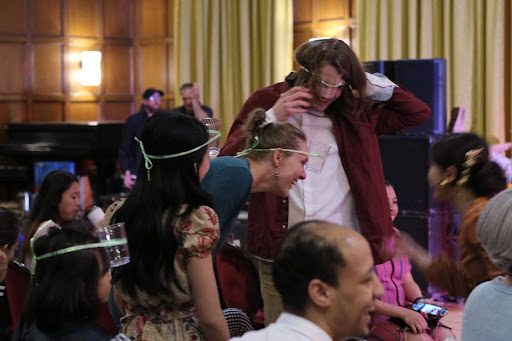
Independence Day’s Game (Ping-to-the-pong).
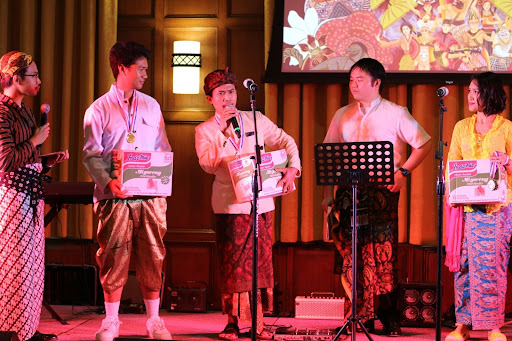
Best Costume’s Winners.
As we neared the close of the program, a student band took the stage to perform a selection of Indonesian folk and pop songs. Their relaxed, upbeat style encouraged the audience to sing along. We then invited everyone to join in a group dance to “Gemu Fa Mi Re,” a popular line dance from Eastern Indonesia. This final moment brought everyone together dancing in a shared celebration of joy and cultural pride. After the performances, we welcomed guests to enjoy an array of Indonesian dishes.
This event was made possible with support from our faculty and peers, and with resources provided through the university’s mini grant program. The funding helped us cover essential costs. We also received helpful guidance from the library staff in preparing materials for public sharing, mostly the trivia on how we can be more informative and highlight the culture . Their support helped us shape this event not only as entertainment, but also as an educational and cultural bridge.
After the success of ICN 2025, we’re excited to continue sharing Indonesian culture through smaller, more frequent events throughout the academic year. We’re currently planning interactive dance workshops, film screenings, and food-tasting sessions to help introduce more people to the beauty of our traditions. We also hope to pass on our experience to future ICN organizers by documenting the event planning process and sharing tips for an even more impactful event.
Organizing ICN this year has been an incredibly rewarding experience. Seeing people from all backgrounds laugh, dance, and enjoy our culture reminded us of how powerful cultural exchange can be. We are deeply grateful for all the support we received, and we look forward to continuing this journey of community and cultural connection.
Stewardship: Indonesian Student Association at University of Michigan (ISA-UM)
Rights: ISA-UM, University of Michigan
Credits: Ridwan
Creation Date: April 18, 2025